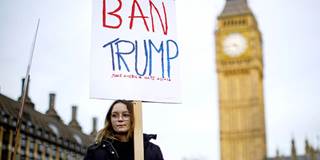Economists typically argue against focusing excessively on the losers from freer trade, and they decry the tendency to overlook the beneficiaries on the export side. They should not be prone to the same fallacy now, by ignoring that US protectionism surely will generate some beneficiaries as well in other countries.
CAMBRIDGE – Defying common sense as well as business and financial elites, US President Donald Trump seems to relish the prospect of a trade war. On July 6, his latest trade restrictions – 25% tariffs on about $34 billion of Chinese imports – took effect. They were promptly met by retaliatory tariffs on an equivalent volume of US exports to the Chinese market. Trump has threatened further measures against China, as well as tariffs on automobile imports from Europe. And it remains possible that he will withdraw the United States from the North American Free Trade Agreement if Mexico and Canada do not agree to amend it to his liking.
Trump’s kneejerk protectionism does little to help the working class that helped elect him. Disaffected congressional Republicans and unhappy corporations that have supported him on other matters may yet rein him in. But those who, like me, thought Trump’s bark would be worse than his bite on trade are having second thoughts about where all of this might lead.
But before we get too carried away with doomsday scenarios on trade, we need to consider other countries’ incentives as well. Trump may well want a trade war, but he cannot have it on his own. A trade war requires other economies to retaliate and escalate. And there are compelling reasons why they should not do so.

CAMBRIDGE – Defying common sense as well as business and financial elites, US President Donald Trump seems to relish the prospect of a trade war. On July 6, his latest trade restrictions – 25% tariffs on about $34 billion of Chinese imports – took effect. They were promptly met by retaliatory tariffs on an equivalent volume of US exports to the Chinese market. Trump has threatened further measures against China, as well as tariffs on automobile imports from Europe. And it remains possible that he will withdraw the United States from the North American Free Trade Agreement if Mexico and Canada do not agree to amend it to his liking.
Trump’s kneejerk protectionism does little to help the working class that helped elect him. Disaffected congressional Republicans and unhappy corporations that have supported him on other matters may yet rein him in. But those who, like me, thought Trump’s bark would be worse than his bite on trade are having second thoughts about where all of this might lead.
But before we get too carried away with doomsday scenarios on trade, we need to consider other countries’ incentives as well. Trump may well want a trade war, but he cannot have it on his own. A trade war requires other economies to retaliate and escalate. And there are compelling reasons why they should not do so.